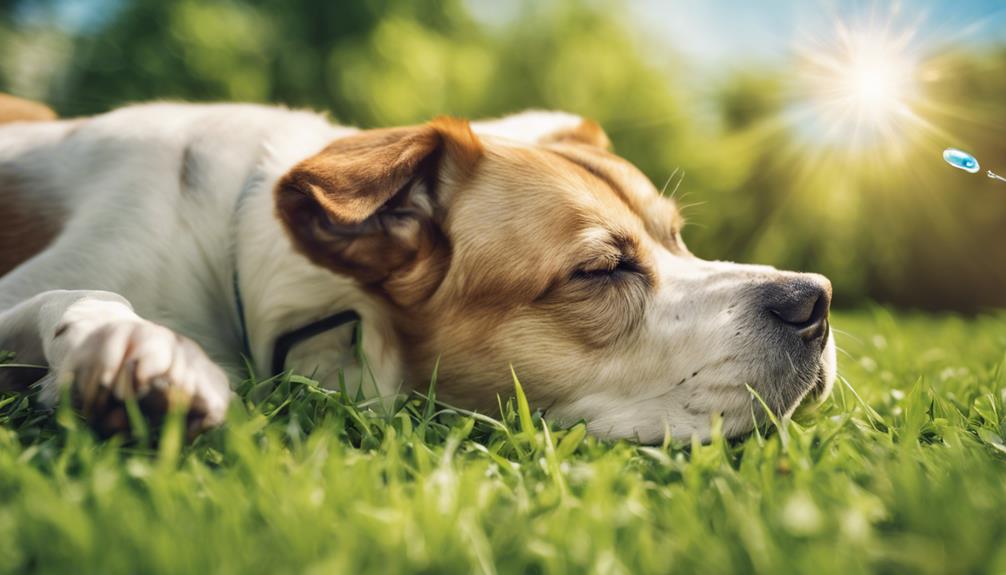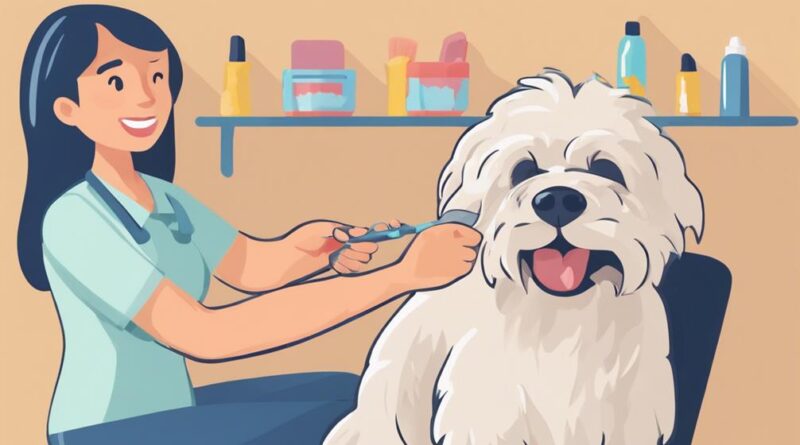How-to Guide: Essential Tips for Dog Health Maintenance
Ensuring your furry companion's well-being is a top priority, but keeping them in peak health can sometimes feel like you're juggling a dozen tasks simultaneously.
From meal planning to playtime, every aspect of your dog's care contributes to their overall health.
But what if there were a way to streamline these essential tasks, making dog health maintenance feel like second nature?
Stay tuned to uncover practical tips that will not only simplify your routine but also elevate your canine companion's quality of life.
Daily Exercise Requirements
To maintain your dog's health, ensure they engage in daily exercise to keep them active and happy. Outdoor activities such as walks, runs, or playing fetch are great ways to ensure your furry friend stays in good shape both physically and mentally. Incorporating playtime routines into your dog's daily schedule won't only help in burning off excess energy but also strengthen the bond between you and your pet.
Taking your dog for a walk in the park or playing a game of tug-of-war in the backyard can provide essential physical activity that your dog needs. These activities stimulate their senses, promote muscle development, and prevent obesity. Dogs are naturally active animals, so engaging them in outdoor activities is crucial for their overall well-being.
Make sure to set aside time each day for your dog to engage in these playtime routines. It won't only benefit their health but also contribute to their happiness and overall quality of life.
Nutritious Diet Essentials
For optimal health maintenance, ensuring your dog consumes a balanced and nutritious diet is essential. Balanced nutrition is key to keeping your furry friend healthy and happy. Provide a diet that includes a mix of high-quality proteins, carbohydrates, fats, vitamins, and minerals. Consult with your veterinarian to determine the best food for your dog's breed, size, age, and any specific health needs.
Establishing a regular feeding schedule is crucial. Dogs thrive on routine, so try to feed them at the same times each day. Avoid free-feeding to prevent obesity and digestive issues. Monitor your dog's weight and adjust the portion sizes accordingly. Remember to provide fresh water at all times to keep your dog hydrated.
When switching your dog's diet, do so gradually to prevent stomach upset. Mix a small amount of the new food with the old, increasing the new food proportion over a week or so. By prioritizing balanced nutrition and a consistent feeding schedule, you're taking proactive steps to ensure your dog's overall well-being.
Regular Veterinary Check-ups
Regular veterinary check-ups are crucial for maintaining your dog's health and detecting any potential issues early on. Preventive care plays a key role in keeping your furry friend happy and healthy. By scheduling regular visits to the vet, you ensure that your dog receives essential vaccinations to protect against common diseases. Your veterinarian will also perform routine examinations to check for any signs of illness or underlying health concerns. These check-ups aren't only important for addressing current health issues but also for preventing future problems.
Establishing a consistent vaccination schedule is vital in safeguarding your dog's well-being. Vaccines help strengthen your pet's immune system and guard against serious infections. Your veterinarian will recommend a vaccination plan tailored to your dog's specific needs based on factors like age, lifestyle, and risk of exposure to certain diseases. By staying up-to-date with vaccinations and attending regular check-ups, you're taking proactive steps to ensure your dog's long-term health and happiness.
Proper Hydration Importance
Maintaining proper hydration for your dog is essential for their overall health and well-being. Just like humans, dogs depend on water to survive and thrive. Adequate hydration benefits your furry friend by supporting proper digestion, regulating body temperature, and aiding in nutrient absorption. Dehydration can lead to serious health issues in dogs, such as urinary tract infections, kidney stones, and lethargy.
To ensure your dog stays well-hydrated, establish a consistent hydration schedule. Provide access to fresh, clean water at all times, especially after activities or on hot days. Monitor their water intake to make sure they're drinking enough throughout the day. Factors like age, size, activity level, and the weather can affect your dog's water needs, so adjust accordingly. Additionally, consider feeding your dog wet food or adding water to their dry kibble to increase their water intake.
Mental Stimulation Strategies
To keep your dog mentally sharp and engaged, incorporate interactive toys and puzzles into their daily routine. Mental enrichment is crucial for your furry friend's overall well-being. Interactive toys like treat-dispensing balls or puzzles that require problem-solving skills can provide a fun and stimulating way to keep your dog's mind active. Engaging in playtime activities not only helps prevent boredom but also strengthens the bond between you and your pet.
In addition to toys, consider incorporating obedience training sessions or teaching new tricks to challenge your dog mentally. These activities not only stimulate their brain but also boost their confidence and focus. Regular walks and outdoor adventures can also provide mental stimulation by exposing your dog to new sights, sounds, and smells.
Dental Care Best Practices
For optimal dental health in your dog, prioritize consistent and thorough tooth brushing as a key practice. Preventive measures are crucial to avoid dental issues in your furry friend. Brush your dog's teeth at least 2-3 times a week using a dog-specific toothbrush and toothpaste.
Establish a routine to make it a positive experience for your dog. When brushing, focus on the outer surfaces in a circular motion, paying extra attention to the back teeth where plaque and tartar tend to build up. Incorporate a dental chew or toy designed to promote oral health to complement your brushing routine.
Regular veterinary check-ups should also include a dental examination to catch any issues early on. Remember, proper brushing technique and consistency are the pillars of good dental care for your dog. By following these practices, you can help ensure your dog maintains healthy teeth and gums for years to come.
Parasite Prevention Methods

To effectively protect your dog from parasites, implement preventive measures such as regular use of vet-approved flea and tick medications. Flea control is crucial in maintaining your dog's health and comfort. Fleas can cause itching, skin irritation, and even transmit diseases. By using flea control products recommended by your veterinarian consistently, you can keep these pesky parasites at bay.
Tick prevention is equally important, as ticks can transmit serious illnesses such as Lyme disease. Regularly check your dog for ticks, especially after walks in wooded or grassy areas. Additionally, consider using tick prevention products like topical treatments or tick collars. These can help repel ticks and reduce the risk of your dog getting sick.
Grooming and Coat Care
Regular grooming and coat care are essential for maintaining your dog's overall health and well-being. By incorporating proper brushing techniques and shedding solutions into your routine, you can help ensure your furry friend's coat stays healthy and shiny.
To keep your dog's coat in top condition, follow these tips:
- Brushing Techniques: Regularly brush your dog's coat to remove loose fur, prevent matting, and distribute natural oils. Use a brush appropriate for your dog's coat type, such as a slicker brush for long-haired breeds or a bristle brush for short-haired breeds. Start brushing from the top of the coat and work your way down to the skin to ensure thorough grooming.
- Shedding Solutions: Combat excessive shedding by providing your dog with a balanced diet rich in omega-3 fatty acids and regular grooming sessions. Consider using deshedding tools like undercoat rakes or shedding blades to minimize loose fur around your home. Additionally, consult your veterinarian if shedding persists, as it could be a sign of an underlying health issue.
Frequently Asked Questions
How Can I Help My Dog Overcome Separation Anxiety?
To help your dog overcome separation anxiety, try solutions like gradually increasing alone time, creating a calming environment, and providing engaging toys.
Behavioral training techniques such as desensitization and counterconditioning can also be effective. Consistent routines and positive reinforcement for calm behavior can make a big difference.
Are There Any Specific Supplements or Vitamins I Should Consider Adding to My Dog's Diet?
When it comes to your dog's diet, consider adding nutritional supplements and dietary vitamins for overall health.
Some common options include omega-3 fatty acids for skin and coat health, glucosamine for joint support, and probiotics for digestive health.
Always consult with your vet before introducing any new supplements to ensure they're safe and appropriate for your furry friend's specific needs.
What Are Some Signs That Indicate My Dog May Be in Pain or Discomfort?
If your dog is in pain or discomfort, watch for signs like:
- Whining
- Restlessness
- Changes in appetite
They may also exhibit:
- Lethargy
- Aggression
- Licking a specific area
When it comes to dental care, remember to:
- Brush their teeth regularly
- Monitor their gums
Weight management is crucial; maintain a healthy diet and ensure they get enough exercise. Prioritize your dog's well-being by being attentive to signs of pain and taking action promptly.
How Can I Train My Dog to Walk on a Leash Without Pulling?
To train your dog to walk on a leash without pulling, start with proper leash training techniques. Use positive reinforcement methods like giving treats when your dog walks nicely beside you.
Practice short sessions regularly to help your furry friend get used to the leash. Stay patient and consistent, rewarding good behavior and redirecting any pulling.
With time and practice, your dog will learn to walk calmly on a leash.
What Are Some Safe and Effective Ways to Calm My Dog During Thunderstorms or Fireworks?
During thunderstorms or fireworks, noise desensitization and relaxation techniques can help calm your dog. Gradual exposure to recorded sounds of storms or fireworks at a low volume can desensitize your pup over time.
Additionally, practice relaxation methods like deep breathing exercises or gentle massage to create a calming environment.
Consistent training and positive reinforcement will reinforce these calming behaviors, making future situations less stressful for your furry friend.
Conclusion
Overall, keeping your dog healthy requires dedication and consistency. By ensuring they get enough exercise, eating a balanced diet, visiting the vet regularly, staying hydrated, providing mental stimulation, maintaining good dental care, preventing parasites, and keeping up with grooming, you're setting your furry friend up for a long and happy life.
Remember, your dog depends on you for their well-being, so make their health a top priority.
